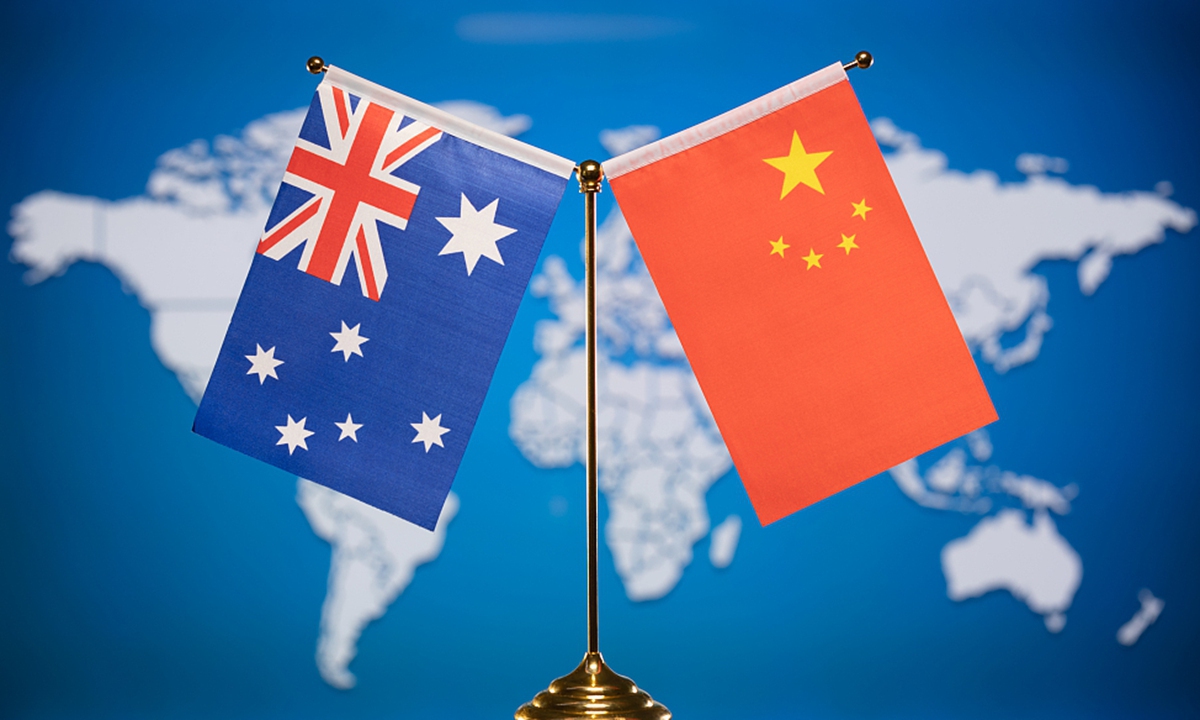The first shipment of Australian coking coal was set to arrive at a southern Chinese port on Wednesday night following breakthrough trade talks this week, reflecting the gradual restoration of bilateral economic and trade ties. Experts urged Australia to seize this important opportunity to inject more positive factors into their economic cooperation for mutual benefit.

China Australia Photo: VCG
The Chinese Foreign Ministry said on Wednesday that China will restart and resume dialogues and exchanges with Australia, expand cooperation and control differences to boost the rebuilding of mutual trust and bring relations back to a normal track.
The bulk vessel Magic Eclipse, which is reportedly carrying the coal from Australia, departed from Hay Point on January 24 before heading to a port in Zhanjiang, South China's Guangdong Province. The ship is due to arrive at 10 pm (Beijing time) on Wednesday, according to MarineTraffic, a vessel tracking platform.
The first batch of the Australian coal will be delivered to a local production base of Baoshan Iron & Steel Co (Baosteel) in Zhanjiang, insiders said.
An employee with the company declined to comment when being reached by the Global Times on Wednesday, but said that the company is paying close attention to Australian coal imports.
It's the first shipment of Australian coal in over two years, after former Australian prime minister Scott Morrison sabotaged bilateral relations.
The resumption of Australian coal exports came after video talks between Chinese Commerce Minister Wang Wentao and his Australian counterpart Don Farrell on Monday.
"The breakthroughs are within expectations, reflecting the general trend of the restoration of China-Australia economic and trade relations," Wang Shiming, a professor at the School of Politics and International Relations of East China Normal University, told the Global Times on Wednesday.
The strained bilateral relationship in recent years caused much damage to the Australian economy, so it's one of the most important tasks for Australia's new Labor government to improve relations with China, he said, and a requirement for the development of the China-Australia comprehensive strategic partnership.
There is huge room for economic and trade cooperation, including deepening cooperation in third-party markets. However, Australia's double standards such as tightened security reviews of Chinese companies' investment and operations in Australia would hinder the normalization of relations, Wang said.
A healthy and stable relationship between China and Australia, which are both important countries in the Asia-Pacific region and have highly complementary economic structures, serves the fundamental interests of both peoples and is conducive to peace, stability and prosperity in the region, Chinese Foreign Ministry spokesperson Mao Ning said at a press briefing on Wednesday.
China is ready to work with the Australian side to implement the important consensus reached by the two countries' leaders during the G20 summit in Bali and the results of the China-Australia Foreign and Strategic Dialogue, Mao said.
China is a prime market for Australian goods such as coal, iron ore and wine. However, many of these goods lost ground in the Chinese market as domestic companies sought alternatives to reduce the risks from disruption amid cooled relations.
Bilateral trade stood at $220.91 billion in 2022, down 3.9 percent year-on-year, according to China's General Administration of Customs. Australian exports to China fell 13.1 percent year-on-year to reach $142.09 billion last year.
Trade with China is more than the next three largest trading partners combined. It's in Australia's national interests to have good economic relations and to trade with China, Australian Prime Minister Anthony Albanese said on Tuesday, Reuters reported.
"Our position on China is clear that we will cooperate where we can, disagree where we must and engage in our national interests," he said.
Zhou Fangyin, a research fellow at the Guangdong Institute for International Strategies, told the Global Times on Wednesday that Australia has become more pragmatic in its foreign policy, and further recognized the value of China's market for its economy.
"Along with the restoration of bilateral ties, cooperation in sectors, including trade and tourism, is expected to be promoted," Zhou said, noting that "Australia will eventually find out where its interests lie."
Immediately following signals of easing in the relationship, Australian businesses started to take a close look at trade resumption.
A Tianjin-based trader surnamed Li told the Global Times on Wednesday that there is a growing expectation and possibility for more Australian hay to be exported to China.
"As other products [such as coal] are coming in, the full resumption of hay shipments could just be a matter of time," he said.


